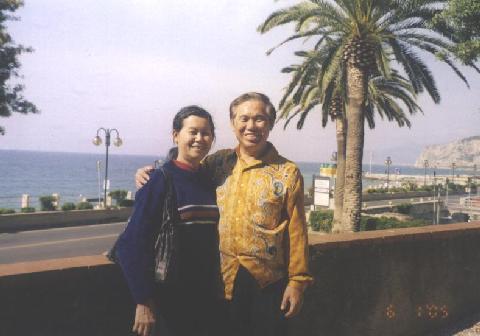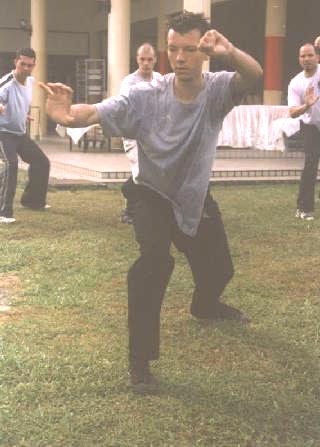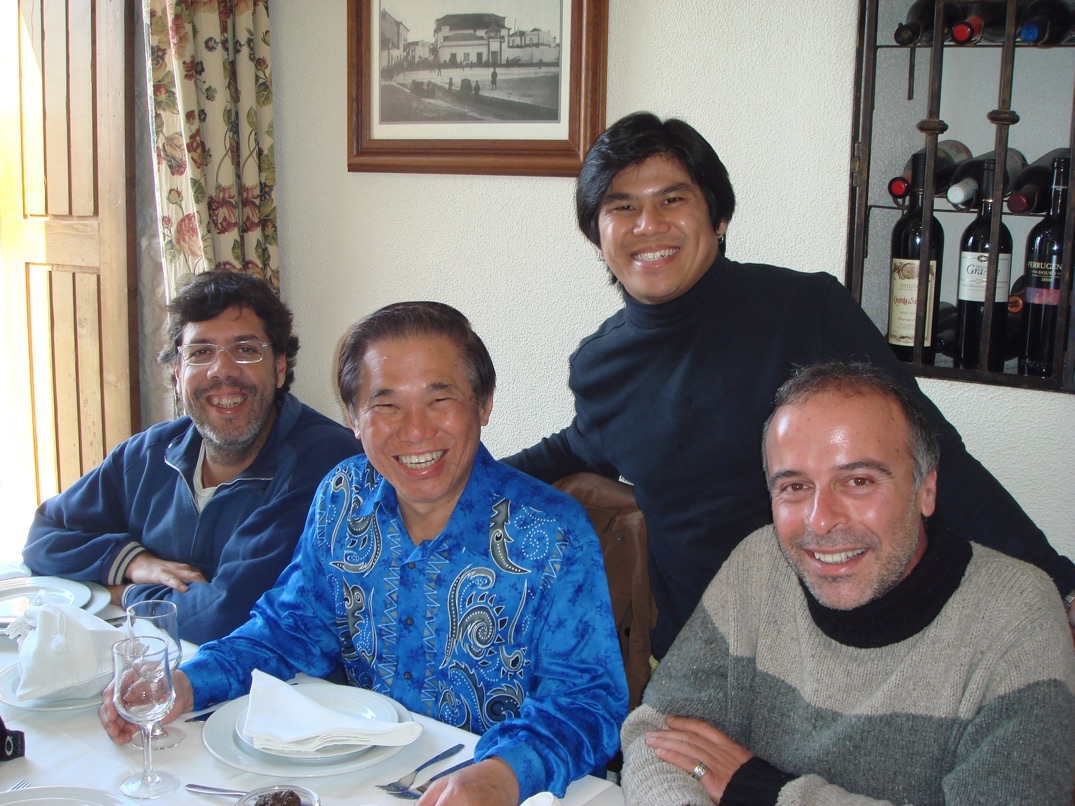January 2006 (Part 1)
SELECTION OF QUESTIONS AND ANSWERS


We teach by examples in Shaolin Wahnam. Sifu Wong does not merely talk about the importance of a happy family; he demonstrates it in his daily living. The above photo was taken while Sifu Wong and Simu (Sifu's wife) were holidaying in Sifu Attilio's hotel in Punta Est in Italy in May 2005
Question 1
I have a question that has bugged me since I kissed a young lady who I went out on a date with. I was wondering is the nature of romantic love doomed in egoism.
— Watts, England
Answer
The answer is certainly “no”. Romantic love is one of the most beautiful things in the world, where the true lover, if needed, often sacrifices himself or herself for the beloved one.
Question 2
I was speaking with another well known internal arts practitioner and he told me that it is stuck in egotism. I was thinking it might be true, because if our lover cheats or leaves us we are devastated, and can feel betrayed, jealous etc. We feel lifted when our lover tells us she loves us, holds us, is near us etc.
Answer
In my opinion the well known internal art practitioner you referred to is mistaken. What he referred to was not true romantic love, but egoism mistaken for love. He did not really love the woman. She was only an object to satisfy his own ego. That was why he would feel betrayed and jealous if she left him. If he truly loved her, he would think and feel in her interest instead of his own.
True love involves giving, not taking. If you truly love a woman but she finds someone better, you should not only let her go but find out to the best of your ability but without being too obtrusive, whether the other person is sincere. If he is, you should help them to be together, knowing she is happier with him than with you. But if he is insincere, you should tactfully warn her, but you still leave her to her choice.
Should you feel jealous or inadequate if the woman leaves you? No, you should not. Different people have different tastes, in love as well as other choices. If a woman chooses wearing jeans over skirts, or apples over oranges, it does not mean that skirts and oranges are inferior to jeans and apples. It only means that this particular woman likes jeans and apples more. Other women may have different tastes.
In the same way, just because one woman prefers another man over you, even though she is one you love, it does not mean the other man is better than you. It just means she likes him more. There are many, many other women who like you. Instead of feeling betrayed and jealous, you should be glad that both you and she find out early enough that you are not her taste. Had his realization happened later, it would have caused more suffering to you, her and possibly other people.
Instead of feeling negative about the situation, you should sincerely wish them well, terminate your relationship with her and spend your time and effort in finding another woman whom you also love and who also responds to your love. If you have such wisdom and consideration, there are certainly many, many women who love to be loved by you. But you must choose wisely and sincerely.
Question 3
However, I'm not too sure, I know that after I kissed her, and I opened up myself a warmth began to flood my being, I desired to hold her, and kiss her, and when she expressed her like of me, I felt elevated. It felt different from the egotistical elevation I used to get when people feared me, or girls told me how good looking I was etc. It felt like a spiritual elevation.
Answer
Your feeling and responses suggest that yours is that of true love and not egoism. Congratulations, and I wish you the best in your development.

We teach by examples in Shaolin Wahnam. We do not just talk about applying typical kungfu techniques in combat, but actually do it. Here Mark, an assistant instructor of Shaolin Wahnam England, is practicing kungfu combat application during an intensive course in Malaysia
Question 4
Is the nature of romantic love egotistical? Is the elevation cause by the expression of a loved one proclaiming their love for you egotistical?
Answer
No, true love, romantic or otherwise, is not egoistical. True love involves giving, not taking. The elevation is caused by the expansion of your spirit, not by egoism. When you give, you open your heart and your spirit expands.
Question 5
Is monogamy an egotistical desire?
Answer
No, it is not an egoistical desire. It is a desire of God and a fulfillment of your promise to God made at your wedding.
God wants you to love and be true to your wife, and you promise God that you will do so to the best of your ability. Leaving your wife for another woman is betraying your promise to God; it is tantamount to deserting God.
Question 6
I ask you, because you, and some other high level practitioners, fly in the face of my previous belief that to be highly spiritual, or the only place for spiritual cultivation, was a monastery or in solitude. I'm thrilled at the prospect that I can be in society and still cultivate spiritually.
Answer
I am glad of your realization. Spiritual cultivation lies in your heart. It can be cultivated anywhere — in a monastery, in solitude and in a busy city, in company as well as in our daily workplace.

We teach by examples in Shaolin Wahnam. We do not just talk about smiling from the heart but actually demonstrate it, as evident in this photograph of Sifu Wong and family members of Shaolin Wahnam.
Question 7
I've had a lower back injury for many years now, coming to about 12 years. I am always positive and block out my injury, but it has still remained with me. I have felt chi pushing through the area where I'm injured. I have experienced this a few times where I can feel it working in the area.
— Chris, Australia
Answer
Don't worry about your back injury. It will certainly go away. Perhaps it has gone away already. What you feel could be a memory of it. Sometimes this happens. The physical injury has been overcome, but the memory remains.
In Chinese philosophy, especially Taoist philosophy, every organ has its own spirit and memory. Chinese is a very concise language, and is different from English in its imagery. “Organ” here may be extended to mean every living cell. The same idea is also present in Buddhist philosophy, but is expressed differently. Every unit of life has its own karma, and the three factors forming karma are thought, words and deeds in that order of importance.
Hence, if one keeps on thinking of and speaking about his illness, he would aggravate it. He would feel the pain even when the physical defects have been rectified.
This fact is not generally known. One reason is that in the past such teaching was exclusive. Another reason is the linguistic difference between Chinese and English, and in the case of Buddhist philosophy between Sanskrit and English. In other words, even when an open-minded person reads about this fact translated into English, he or even the translator could miss the fact. For example, a concise Taoist statement like “the heart has a spirit” can easily be mis-understood as something superstitious.
Indeed, the concept of “heart-spirit”, or “xin-shen” in Chinese, is very important in traditional Chinese medicine, though its importance may have been minimized in post-Mao Chinese medicine. It is interesting to note that the whole range of psychological disorders so prevalent in Western societies today, ranging from depression to phobia, can be summed up in the phrase “weakening of the heart-spirit”.
It is understandable if Western educated people who lack a deep understanding of traditional Chinese philosophy to scoff at this statement. Yet, while conventional medicine has difficulty in dealing with psychological disorders, by strengthening the patients' spirit, their psychological disorders can be overcome. Strengthening the heart-spirit can be effected via herbs, acupuncture and other traditional Chinese therapeutic methods. Practicing genuine chi kung is an excellent way to strengthen the spirit.
So, you should stop worrying about the past injury. Just enjoy your chi kung or kungfu practice.
Question 8
Although I feel confident and positive, the injury still is there. I'm not sure if I'd feel comfortable in teaching when my body is not 100 percent. Would I be doing a dis-service? I would be appreciative on your thoughts, Sifu.
Answer
It is a sign of responsibility when you asked whether you could be doing your students a dis-service if you were not 100% healthy as the arts you were to teach were meant to bring good health.
I am glad that a few of our Shaolin Wahnam instructors raised the same point when I asked them to teach. A hallmark of our school is that we teach by example. We speak with conviction when we say that our chi kung brings good health and happiness, and our Shaolin Kungfu and Taijiquan is combat efficient because we and our students enjoy these benefits. Hence, if a person is sick he certainly does not qualify to be a Shaolin Wahnam instructor, or if he cannot defend himself he does not qualify to teach our Shaolin Kungfu or Wahnam Taijiquan.
Nevertheless, the concept of health can be subjective. In your case I would consider you healthy and combat efficient, although you may still feel your old injury at your back and you may have difficulty handling a professional Muay Thai fighter. As a comparision, someone who habitually takes medication for an obvious illness like asthma would be considered unhealthy, and someone who does not know what to do if an assailant throws him a few punches or kicks would be considered incompetent in combat.
Actually the level of martial art has degraded so badly that today many instructors, including so-called masters, are unhealthy. Many of them have sustained internal injuries for years and some are overtly stressful and aggressive. You are a symbol of good health by comparison.
LINKS
Selected Reading
- Wahnam Taijiquan Simplified Set — Cloud Hands
- Remarkable Recoveries
- Working out Combat Sequences from Specialized Sets
- Cloud Hands in Slow Motion
- Cloud Hands with Force and Speed
- Experiencing the Process of Composing a Kungfu Set
